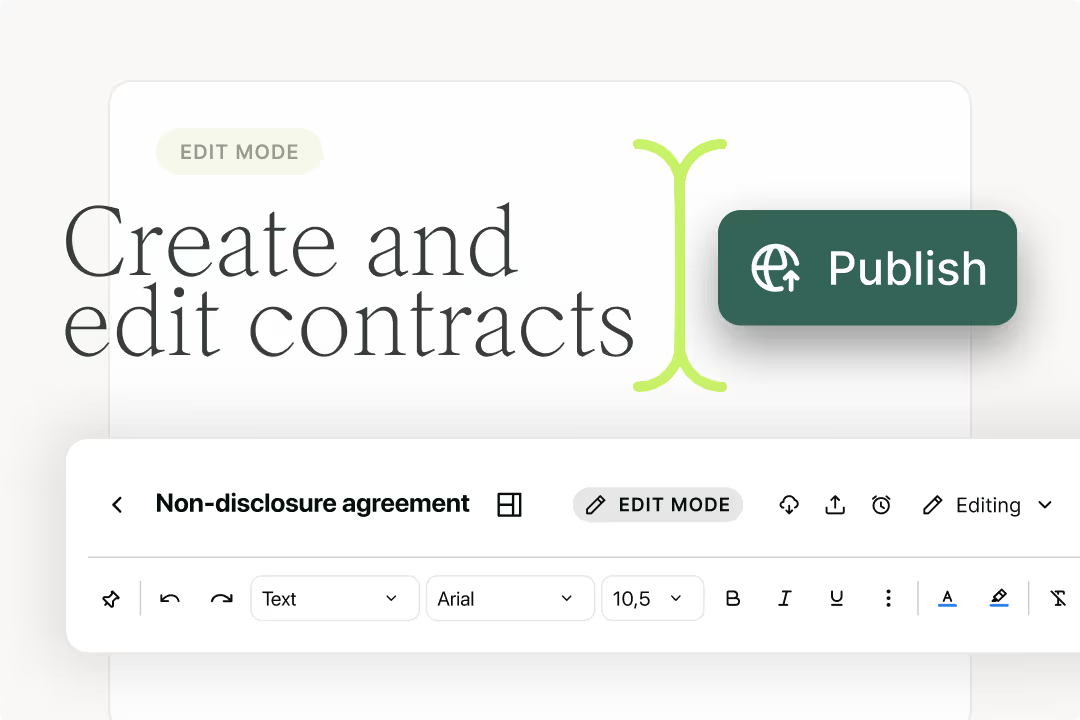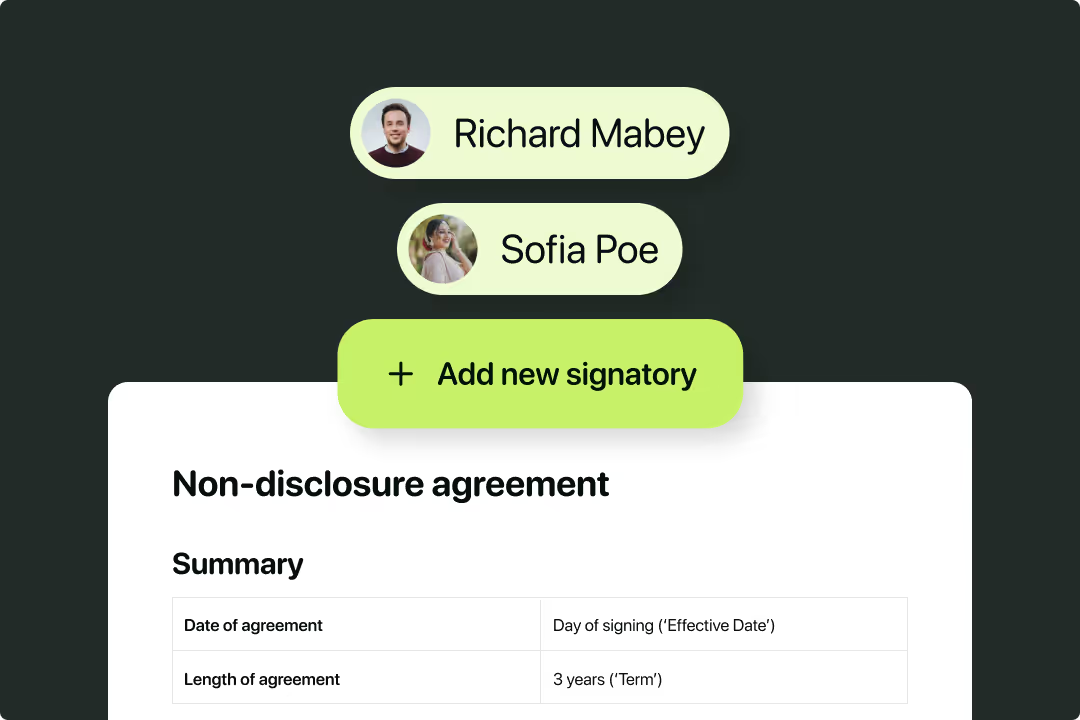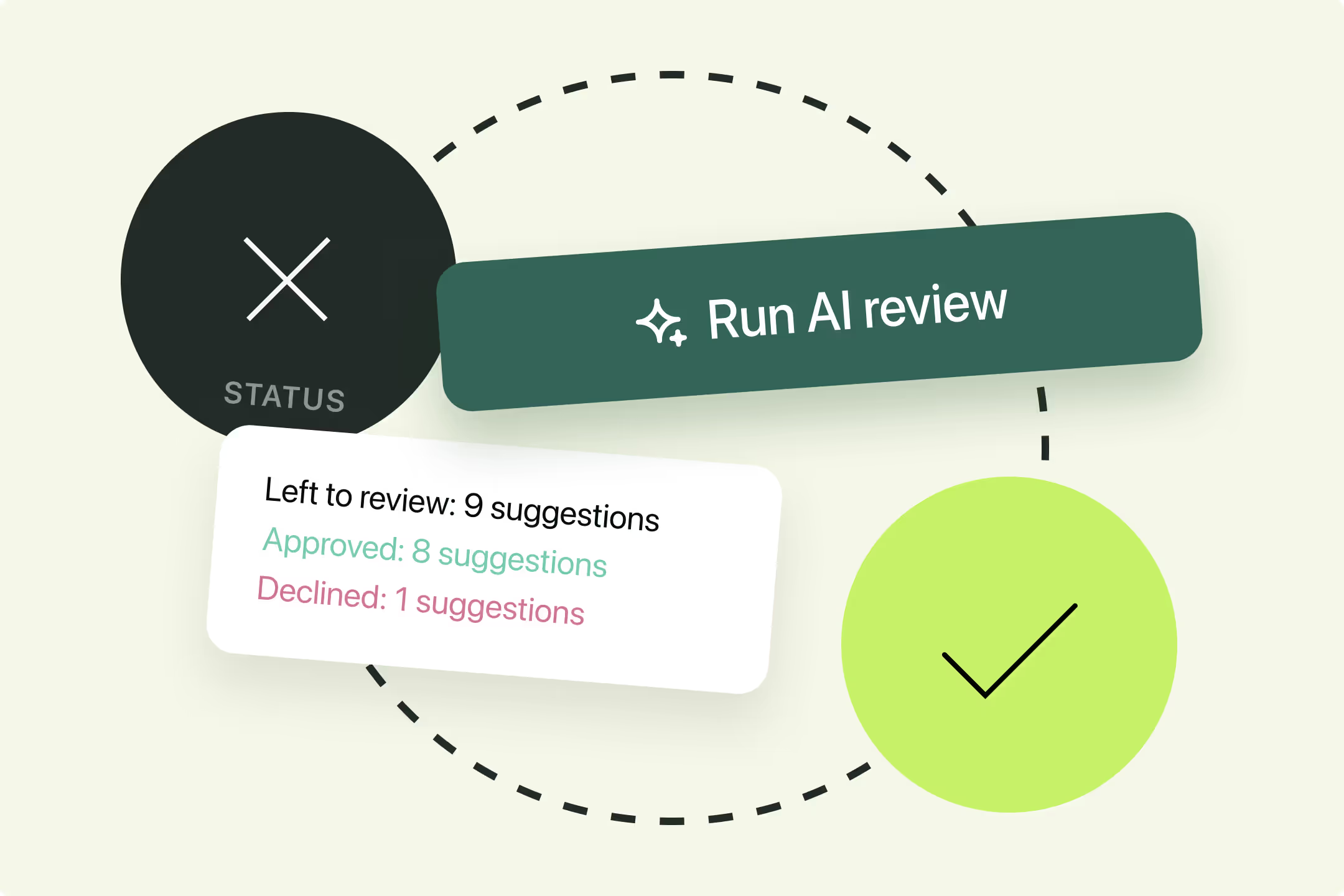Solutions
Customer Support
Resources
A casual attitude to reviewing a contract can come back to haunt you - legally and financially.
A contract review process is essential to reducing this risk and avoiding unwelcome liability. But what actually is contract review, and how can you make the process more efficient?
Contract review is the process of thoroughly reading and understanding a contract before agreeing to its terms. The goal is to make sure the terms outlined are fair, transparent, reduce risk. This can be done manually, or by using contract review software.
During contract review, the document will be examined to confirm that it contains all the elements of a contract, that everything is stated clearly and accurately, without errors or discrepancies, free of potential conflicts, and important, with acceptable terms to help the parties avoid getting locked into an unsatisfactory agreement.
The purpose of a contract review is to ensure that legal agreements and the terms contained within them are robust, and that legal and financial risk is reduced as far as possible to protect the interests of your business.
When someone asks you to sign a contract, they are really asking you to legally bind yourself or your business to the provisions outlined in the document. For example, signing an employee confidentiality agreement opens you up to various consequences, were you to breach the contract.
But there are also financial implications of failing to review a contract. For example:
This is a huge hit to a company’s bottom line, simply because contracts aren’t reviewed and approved properly.

The contract review process often includes several people, depending on the stakeholders involved in the contract itself.
It might begin with the sales representative, who drafts the initial contract and decides the key values, having taken basic terms from the template. This person should review the entire agreement carefully for accuracy before forwarding it to the counterparty and the legal team.
The counterparty will review the proposed agreement to make sure that the risk, legal and commercial implications of the agreement work for them.
It is considered best practice for a contract specialist or legal counsel to review a contract after every round of negotiations and before it is signed by the parties.

There are nuances to this, though. Different organizations will vary in their risk appetite, and the process will often vary depending on the type of contract involved.
Zeno Capucci, Chief Legal and Risk Officer at DocPlanner provides a great example of what this might look like in practice:
“We looked at our average contract value and came up with a specific monetary threshold, below which we’ll generally not have a full legal review. However, if it’s a business-critical service, or if a lot of personal data (or sensitive data) is involved, then regardless of cost, legal would need to be involved.”
Many businesses make all sorts of mistakes during the contracting process, such as:
The final point is perhaps the most important one. While the legal team step in to mitigate the risks the company takes on when agreeing a new contract, they also need to recognize when this work becomes unnecessary, or creates disproportionate friction.
As Daniel van Binsbergen, CEO at Draftpilot, puts it: “It’s legal’s responsibility to protect the business from risk, but they have to balance this risk with the commercial interest of the contract”
Making any of these mistakes can result in a party signing a contract that is not in their business’s best interests, or worse, derailing signing altogether.
What do you need to consider when reviewing a contract, and where should you start? This contract review checklist should set you on the right path.

Every line in a contract is essential and requires a review, but provisions outlining confidentiality, indemnification, termination, and dispute resolution are significant and merit careful analysis.
In most cases, these clauses should be the first terms you address, and you should expect to dedicate a large portion of time to assessing these. Indemnification clauses are a prime example of these critical clauses, as it defines who is responsible for paying for losses and damages, and how much these incurred costs might be.
When reviewing these clauses, you need to ensure that you've mitigated as much risk as possible and that your interests are protected as a priority.
When reviewing a contract, you should also keep an eye out for any ambiguous language that might be left up to interpretation and lead to potential conflicts once the document is signed.
If a certain term or clause can be interpreted in a variety of ways, then it's worth clarifying this to provide more certainty around what's intended and what isn't.
By making the scope of certain terms clearer, legal teams can eliminate costly and time-consuming disputes could later arise surrounding the meaning of words and clauses.
This is an important stage, even when you're reviewing a contract on third-party paper.

Don't forget to look for default clauses that explain the potential ramifications when one side fails to fulfil their obligations along with the non-breaching party’s options. They might be boilerplate but they still apply!
By reviewing these rules, you can develop a better understanding of what happens if you fail to meet your obligations, but also what kind of remedies and recourse is available to you if the counterparty does the same.
Although fill-in-the-blank templates can save a lot of time during the contracting process, they can also be troublesome if any of these blank spaces fall through the cracks.
Regardless of whether you're using an automated template or reviewing a contract drawn up by the other party, any blank spaces should be filled in or removed before the final contract is signed to avoid ambiguity with potentially costly consequences.
It could even raise questions relating to the validity of a contract, and whether the compulsory elements of a contract are present.

Before you sign a contract, you will need to confirm that you understand the termination and renewal terms.
Always be mindful of things like automatic renewal language and opt-out windows that let you know how and when you can end the agreement, along with any repercussions connected with not notifying the other party by a specific date. You can use contract renewal reminders to manage this.
Ensure that all dates and deadlines match previous verbal agreements and begin tracking anything your organization will be responsible for once the contract goes into effect.
If you can track these obligations and contract milestones in a platform like Juro - even better!

When reviewing your checklist, ensure that any risks have been accounted for fully, and that the risks associated with a transaction have been allocated fairly between each party.
If a contract transfers too much risk to one party, then it probably needs amending or negotiating to reach a balance whereby the risk is shouldered fairly by all parties.
Understanding the recourse and remedies available to you in the event of undelivered promises is also a critical part of every contract review checklist, as one of the main purposes of a contract is to provide this security and safeguard in the event of a breach.
Parties should familiarise themselves with what implications they face in the worst case scenario, and how this liability can be either reduced or passed to a different party.
It's also important to understand what course of action needs to be taken in the event of a default or breach, so becoming well-acquainted with these provisions is key.
As most lawyers will know, it's not uncommon for contracts to come with reference documents attached.
If a contract you're reviewing has this, be sure to give those documents just as much attention and care as you afford the initial contract, as there can still be critical information in these additional documents that can add risk to a deal if unaddressed.
There’s a lot of scope to improve your contract review process, so we’ve pulled together a list of expert insights from those working within these processes day-to-day.
The first and most obvious way to improve the efficiency of your contract review process is to automate the repetitive and time-consuming stages that waste the most resource.
Juro’s intelligent contract automation solution offers a fast, accurate, and effective way to do this using AI.
The AI extracts key datapoints and uses them to populate smartfields in seconds, subsequently triggering workflows, automating calculations, and providing summaries if you want them.
Kyle Piper, Contract Manager at ANC, is one of the Juro customers already using Juro’s AI extraction functionality to speed up the contract review process:
{{quote1}}
Juro's contract review agent also allows third-party contracts to be reviewed and redlined against your contract playbooks.
To see Juro’s capabilities in action and explore how it can support your team before, during, and beyond the contract review process, hit the button below.

As we mentioned earlier, not every contract will need eyes on it from legal. There will be many instances where low-risk, standardized contracts (like NDAs) can be self-served on by commercial teams. But this only happens when you have the right tools and frameworks in place.
As Funnel’s CRO, James Ireson, puts it:
“We should ask ourselves: are we negotiating more than we need to be negotiating? What are the trends that we’re seeing? Do the revenue teams have the right tools? Do they know how to talk about this? There’s a particular dance that you do when you are talking to a customer and legal’s involved.”
This enablement could involve contract playbooks that clearly define what will be acceptable, or standardized contracts like OneNDA. It could even be the use of AI agents in the future.
If you’re on the commercial side and needing legal’s support with contract review, make sure you give them the time and space to support you with this properly. This will reduce scope for delays and hiccups that eventually turn into blockers.
Rowan Bailey, Co-founder of Workbounce shares some great insights on this:
“There’s a whole load of stuff that happens under the hood that sales aren’t aware of, that the legal team is working through alongside all that revenue-facing work. If you ask legal for their help on a sales issue late in the day and with no notice, and you get a short answer back from them, then you shouldn’t be surprised.”
Related to the advice above, it’s also important to try and bring legal teams into review conversations earlier. This helps to prevent a situation where the commercial team have set expectations to a customer that the legal team later dispute. It also gives the counterparty more time to warm up to the legal team, and this should make them more willing to compromise further down the line.
Adam Glick, VP of Legal Affairs at Front has discussed why lawyers should think about customer acquisition in detail. Here’s what he says:
“I subscribe to the theory that a legal department should be involved with customer acquisition much earlier; ideally, when the sales team begins to discuss the “legal element” of the transaction. It’s helpful to introduce the respective legal teams as early as possible in order to assist in the contract review process.”
Juro is the intelligent contract automation platform that allows users to review contracts in-browser with a seamless, flexible approval workflow and the ability to skip back through previous versions with one click.
This means legal and business teams can automate routine contract workflow in one unified workspace, with a seamless review process that enables real-time collaboration and data collection.

By creating a review workflow that can be completed quickly, in-browser, forward-looking legal teams can create a contract process that will scale with the business, instead of needing to hire more and more contract managers or outsource work to expensive law firms.
If you want to find out more about Juro’s contract review functionality, book a personalized demo today. If you still have unanswered questions about the review process, check out our FAQs below.
It is common for lawyers to review contracts, particularly if they are high in value. However, contracts can also be reviewed by non-lawyers if they are standardized contracts.
Contract stakeholders from other departments can also review simple contracts, so long as the process outlined within the organisation allows for this.
A contract review form is a document completed when a department is requesting in-house legal counsel to review a specific contract.
In a manual contract workflow, it can take lawyers weeks to review a contract, depending on their workload, the nature of the contract and how complex it is.
This can be problematic for sales teams looking to capture revenue quickly, as it can create bottlenecks within the sales process.
Fortunately, by reducing contract admin and streamlining the contract negotiation and review process, businesses can speed up contract review processes significantly.
Lorem ipsum dolor sit amet, consectetur adipiscing elit. Suspendisse varius enim in eros elementum tristique. Duis cursus, mi quis viverra ornare, eros dolor interdum nulla, ut commodo diam libero vitae erat. Aenean faucibus nibh et justo cursus id rutrum lorem imperdiet. Nunc ut sem vitae risus tristique posuere.

